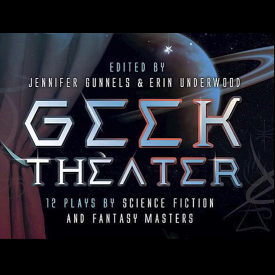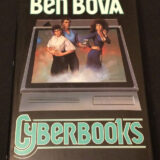
- Paperback: 496 pages
- Publisher: Open Road Media Sci-Fi & Fantasy (December 2, 2014)
- Language: English
- Kindle: $9.99
- Paperback: $15.20
The Genome, the latest novel by popular Russian speculative fiction author Sergei Lukyanenko, is a curious amalgam of disparate elements. I’m not sure it entirely works, but it largely did for me, and, in any case, I applaud the effort at trying something different.
The novel starts with the meeting of two “speshes” – human beings genetically reprogrammed for specific tasks. The main character, Alex, has been modified to pilot and captain starships. Kim is undergoing a metamorphosis, an event that happens to every spesh when they hit puberty where their latent abilities manifest. Only, it isn’t a typical metamorphosis, and Kim’s specialty is not immediately apparent.
So far, so good. We seem to be in cyberpunk territory (the novel will also feature clones and a human consciousness uploaded into a virtual space, common tropes of the subgenre). Except, Alex, who has just gotten out of the hospital after a catastrophic injury, wants back into space, and eventually gets a commission as the captain of a starship. Oh, okay. The Genome is actually going to be a space opera.
Except, no, it takes over 100 pages before anybody even steps onto a starship. Many of those pages are taken up with the ritual of choosing a crew (which amusingly involves cigars and alcohol), a process which I found rather entertaining. And, when the crew is assembled and the ship launches into space, it turns out that its mission is to ferry alien tourists around exotic planets. Not exactly the stuff of intergalactic military adventure.
For a long time, it looks like the book will actually focus on what a dysfunctional family the crew are, as their personalities clash with each other and, inevitably, the aliens they take on board. Again, I found this quite entertaining: the characters are well drawn and interact in interesting ways. The alien races depicted in the novel are fun, and the stories of the ones we actually meet are also quite involving.
Eventually, The Genome turns into a mystery when one of the aliens on board the ship is brutally murdered. The novel is faithful to the tropes of mysteries: it plays fair with the reader by sprinkling clues throughout, allowing an astute mystery devotee to solve the puzzle on her own; the mystery ends when the detective invites all of the suspects into a room to explain the reasoning that led him to the identity of the killer, and; the investigator on the case is a detective spesh who has patterned his life after, and calls himself, Sherlock Holmes.
This is one of the few elements of the novel that really clanged for me. Before I was a science fiction geek, I was a mystery geek; it may be that I have just read too many Holmes pastiches to enjoy reading them any more. It may be that Lukyanenko’s grasp of character was otherwise so sharp that it was disappointing that he would choose to use a stereotype in such an important role in the novel.
I was also not impressed by the stakes inflation that came with this part of the novel: the dead alien was actually a noble of her species, and if the mystery wasn’t solved within 48 hours, the result would be a war which would certainly end in the destruction of one or more races. The novel had already captured and sustained my interest; raising its stakes to such an absurd level was not necessary.
At this point in the review, I have a confession to make: I may have completely misread the novel. According to the press release that accompanied the book, “the original Russian version contains a coded message in the final chapter. Reading only the capital letters, one finds: ‘This novel is a parody of space opera and cyberpunk. The author values your sense of humor.” For me, a key element of parody is exaggeration, and I didn’t find any of the elements of the book to be too far removed from the norms of the various genres being worked (with the exception of Holmes and the stakes inflation which, in a parodic reading, make much more sense.). This may have been a problem of translation, since subtle differences in word choices could change the sense of what the author is trying to convey. Or, I may have just missed the signs. In any case, this adds another level of complexity to an already very interesting work.
So, back to the review (based on my original reading of the text):
With all this character and plot stuff going on, you might think that Lukyanenko wouldn’t have any time to explore ideas, but he does throw a couple into the mix. All of the speshes, for example, undergo emotional as well as physical changes. In the case of the Captain, he gains compassion for his passengers and crew but loses the ability to love a woman; the latter change, it is argued, makes him better able to bond emotionally with his ship. (The process of piloting a semi-sentient starship, which involves a kind of melding of minds, is fascinating.) Each spesh has similar emotional additions and deletions to make them better at their jobs.
But at what cost? One of the other characters argues that the Captain has been crippled, and that he could never experience the depth of emotional connection with a starship that he can with another human being. He counters that the emotions of human beings have always been determined by a combination of their genetic inheritance and their environment, and the creation of speshes, with their strengths and weaknesses, just makes plain a process that was always there but hidden. And don’t even get me started on what effect this has on the concept of free will…
Let a thousand dorm room debates begin!
The first big confrontation in The Genome doesn’t happen until 200 pages into the novel, when a cargo ship threatens to ram the main ship, which would knock it off its course, which would take it into an area of space with natives hostile to the alien tourists on board. The conflict was tense and resolved in an unexpected but satisfying way. I suspect, though, that had the novel been written by an English speaking writer, this confrontation would have happened within the first 50 pages, with background and character either explored on the fly as the plot developed or jettisoned entirely. Lukyanenko clearly knows what he is doing, however: the solution of the crime makes us rethink some of things that happened going back to the beginning of the book.
The Genome contains occasional moments of sly, wry commentary. At one point, for instance, one of the characters tells another: “We have to talk. This elicits the following passage: “‘We have to talk’” is a magic phrase, one of the few that instantly puts a person into a serious mode. No one ever says it in order to talk about the weather or to discuss weekend plans.” Moments like these add to the fun
If you like your genres and sub-genres cut and dried, The Genome is probably not for you. However, if you have an adventuresome palate and enjoy your genres and sub-genres sliced and diced, you should find a lot to enjoy in Lukyanenko’s novel.










